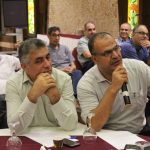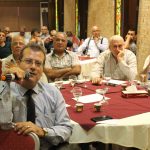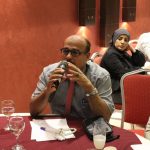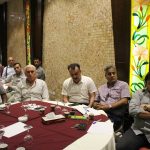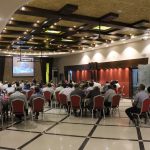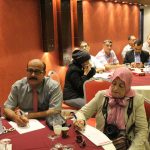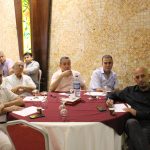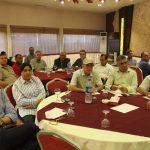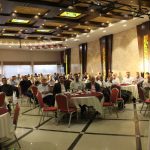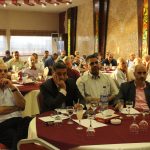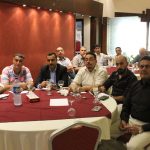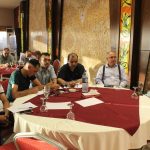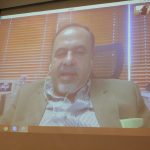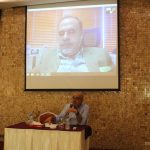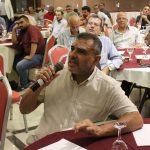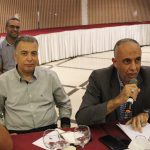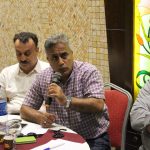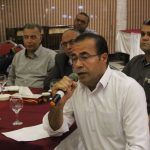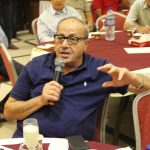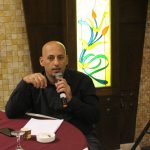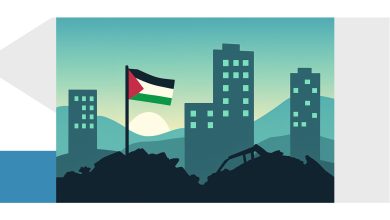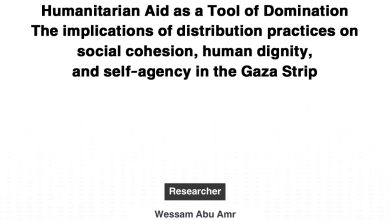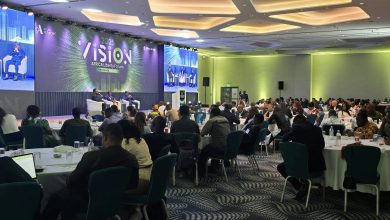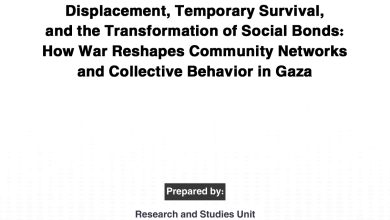Roundtable Discussion: The Palestinian Cause and the Region
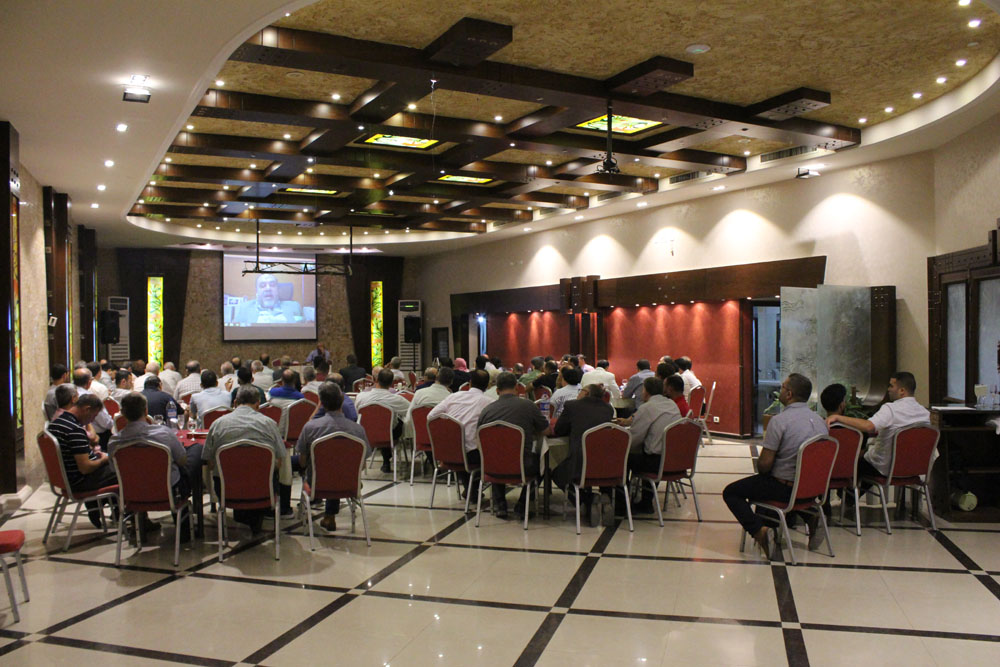
Pal-Think organizes a roundtable discussion about the Palestinian Cause and the Region hosting Dr. Oraib Rentawi, Director of Al-Quds Center for Political Studies, writer and political analyst in Amman – Jordan.
Pal-Think for Strategic Studies held a roundtable discussion in Gaza, hosting – via video – Dr. Oraib Rentawi who presented his paper on The Palestinian Cause and the Region. Writers, researchers, academics, businessmen, and representatives for different Palestinian political parties and civil society associations, all attended the discussion.
Mr. Omar Shaban, Director of Pal-Think for Strategic Studies, opened the discussion by welcoming and thanking the attendees for their valuable participation as he also introduced Dr. Rentawi for his research on the Palestinian cause.
Dr. Rentawi stated that the year 1979 was pivotal. It formulated the region’s features as this year witnessed signing Camp David Accords thus the exit of the largest Arab power, Egypt, from the Israeli-Arab conflict. It also recorded the victory of the Islamic Revolution in Iran relinquishing Iran’s Shah who allied with Israel and the US, so Iran became a regional role-player. In addition, this year witnessed the emergence of the Salafi Jihad party and its role in the region, starting from reconciliation with the US and the occurrence of Afghani Jehadia party and its use to encounter Shea’a after the victory of the Revolution in Iran.
During this year, there was a military coup in Pakistan and occurring icons of Salafi Jihadi and the increasing level of India confrontation.
Rentawi presented other incidents that happened in the following year manifested in Iran-Iraq War, inducing Iraq confronting Iran in addition to King Fahed’s Peace Initiative that Palestinians renounced.
Following his paper, he highlighted the peak of Salafi and Terrorists in the 9/11/2001 incident. At this point, there were escalating accusations against terrorism and Muslims. This period of time marked the proposition of the Arab Peace Initiative in Beirut Summit – 2002. Furthermore, he talked about the beginning of the riddance of Salafi Jihad.
These changes affected the Palestinian cause as Hamas Party won Palestine General Elections and a proposition the theory of Iranian rebellion and consideration for the Salafi Jihad.
Rentawi highlighted the improvements of the Arab Spring 2010 described dangerous by the countries of Axis as the opposing revolution started.
Rentawi believed that this period of time witnessed four significant pillars:
1- Gulf: The gulf countries believe that Iran is utterly hazardous; being said, there is an affinity between the Gulf and Israel and thus American cooperation. Palestinians surely pay the price of this kind of cooperation. It has been discussed that the deal of the century has been dissected in some of the Gulf’s capitals. This center establishes lukewarm relations with the Palestinian Authority except for Sudia Arabia whereas it contrasts the Islamic Stream and Hamas movement.
3- Jordan- Egypt: Arab countries of Axis hold the responsibility of this center of countries as it has relations of peace with Israel causing Jordan, in particular, to pay much at some point. In addition, this center has robust relations with the Palestinian Authority and a necessary and logical relation with the Hamas movement.
3- Qatar-Turkish: Both have advanced relations with both Israel and the political Islam and good relations with the PA and Hamas movement. This area is assumed Hamas rehabilitation politically.
4- Resistance and Reluctance: this center does not adopt care of the Palestinian state; however, it has lukewarm relations with the PA and fickle ones with Hamas which is held with treason for its closeness with Syria. Now, Iran tries to recreate relations between Hamas and the Syrian Regime.
“These four pillars are changeable based on the political situation, at any time.” Rentawi affirmed. “The increasing influence of the regional powers such as Qatar, Iran, Turkey and others is a result of the gradual withdraw of the superpower countries like the US from the Middle East.
The Palestinian split harmed the Palestinian Cause when it called for help of the countries in the aforementioned four pillars” Rentawi added.
Palestinians are assumed to exploit the disassembly of the pillars’ countries in addition to the capability of functioning this fragmentation for the benefit of the Palestinian Case in light of all the breakdown of the UAE-SA pillar after being engrossed in the Yamani War, the return of the Iranian-Qatar and Iranian-Turkish relations, the return of the wave of the Arab Spring in Sudan and Algeria, the possibility of a third wave of the Arab Spring in other Arab countries.
Rentawi talked about the possibility of the occurrence of new influential powers in the region that have to be followed and built good relations with; for the reinforcing of the Palestinian cause amid the international arena in particular in the UN as Palestine started losing many of its advocates in both African and South America. “One of the increasing powers in the region is Ethiopia” Rentawi mentioned.
“No one has an explicit image of the dilemma of the Palestinian split. Both the public and the political elites think that the Palestinian status is in a political maze now needing to identify the national effort towards the Palestinian cause and to continuously search for new methods to resolve the Palestinian conflict” Rentawi screened.
At the end of the discussion, attendees raised questions in regard to what Rentawi stated. Moreover, Rentawi confirmed the necessity of renewing the representative ruling leaders for the Palestinian People that is full of youth capabilities; this came as an answer for one of the attendees’ questions about the practical steps that have to be set for the situation’s development.
Rentawi emphasized the significant entry for a differently-shaped and organized period, calling Arabic to be doers rather than being silent. In the end, Mr. Rentawi was thanked for his deep, influential and flourishing discussion and the attendees for their interactive participation.

